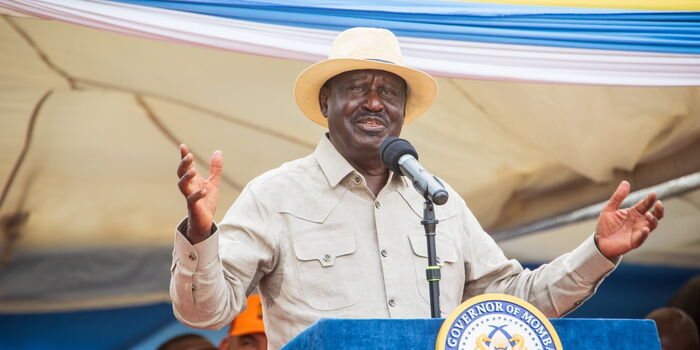Orange Democratic Movement (ODM) party leader Raila Odinga has once again sparked a major political debate by questioning the role of Members of Parliament (MPs) in managing public funds.
Speaking on Wednesday during the Katiba Day Celebrations, Raila insisted that the country needs a referendum to decide whether legislators should be allowed to both manage and oversee development money through the National Government Constituencies Development Fund (NG-CDF).
According to the former Prime Minister, Parliament has a clear constitutional mandate, which is limited to representation, lawmaking, and oversight of government activities. He argued that MPs should not take up the role of contractors while at the same time playing the oversight role.
“Parliament is constitutionally mandated to do representation, legislation, and oversight. If you are a contractor and an MP, who then is overseeing you?” Raila posed, highlighting what he described as a serious conflict of interest.
Raila Challenges NG-CDF Structure
Raila Odinga’s remarks directly challenge the current setup of the NG-CDF, which allows MPs to initiate and manage development projects in their constituencies. In his view, this arrangement compromises accountability because lawmakers cannot effectively monitor projects they are directly implementing.
He explained that development should strictly remain under county governments, which were created by the 2010 constitution to handle local projects and service delivery. Raila made it clear that he does not oppose development at the constituency level but insisted that it should not bypass county governments.
“We are not against development projects in constituencies, but under this constitution, constituencies are not devolved units.
Devolution has only two levels — the national government and the county governments. It is wrong for the national government to jump counties and create another level below them called NG-CDF. That is unnecessary,” Raila stated.
He emphasized that constituencies should work hand-in-hand with county governments instead of running parallel systems that undermine devolution.
Call for a Referendum
To resolve the dispute once and for all, Raila suggested that the question of NG-CDF should be subjected to a referendum. He argued that the people of Kenya should be given the chance to decide whether MPs should both implement and oversee constituency projects.
“I have said this amendment you introduced in Parliament exists, but let us take it to the people. Let us put it to a referendum and test if citizens will accept that Members of Parliament can implement and at the same time oversee projects. Over this, there is no compromise,” Raila declared.
The ODM leader admitted that this position may not be popular among MPs and some voters, but he remained firm that he will not change his stand.
“I know this particular stand will make me unpopular, but I honestly don’t care. I will stand my ground on this matter,” he said, stressing that his push for accountability is more important than popularity.
Raila Criticizes Key Institutions
Apart from his call to scrap NG-CDF, Raila also used the Katiba Day platform to reflect on how Kenya has failed to live up to the vision of the 2010 constitution. He singled out the National Police Service (NPS), accusing it of neglecting its duty to protect Kenyans and uphold human rights.
According to him, cases of extrajudicial killings, torture, disregard for human dignity, and violations of the right to life have been rising under the watch of the police service.
Raila also expressed concern about the Independent Electoral and Boundaries Commission (IEBC), saying it has consistently failed to win public trust since the return of multiparty politics in 1992.
“The IEBC is another institution that has made little progress in securing what Kenyans wanted. The same issues we faced in 1992 still follow us today. Confidence in the commission remains extremely low, and our elections continue to be among the most expensive in the world,” Raila observed.
Standing Firm Despite Opposition
Raila’s bold remarks show his readiness to confront controversial issues even when they put him at odds with MPs and other political leaders. His demand for a referendum and his sharp criticism of state institutions underline his long-standing position as a reformist pushing for accountability and respect for the constitution.
While many legislators are likely to resist his calls to abolish NG-CDF, Raila’s statement has once again opened a national debate about the balance of power between MPs, county governments, and the institutions charged with protecting democracy and human rights.
Join Government Official WhatsApp Channel To Stay Updated On time
https://whatsapp.com/channel/0029VaWT5gSGufImU8R0DO30


